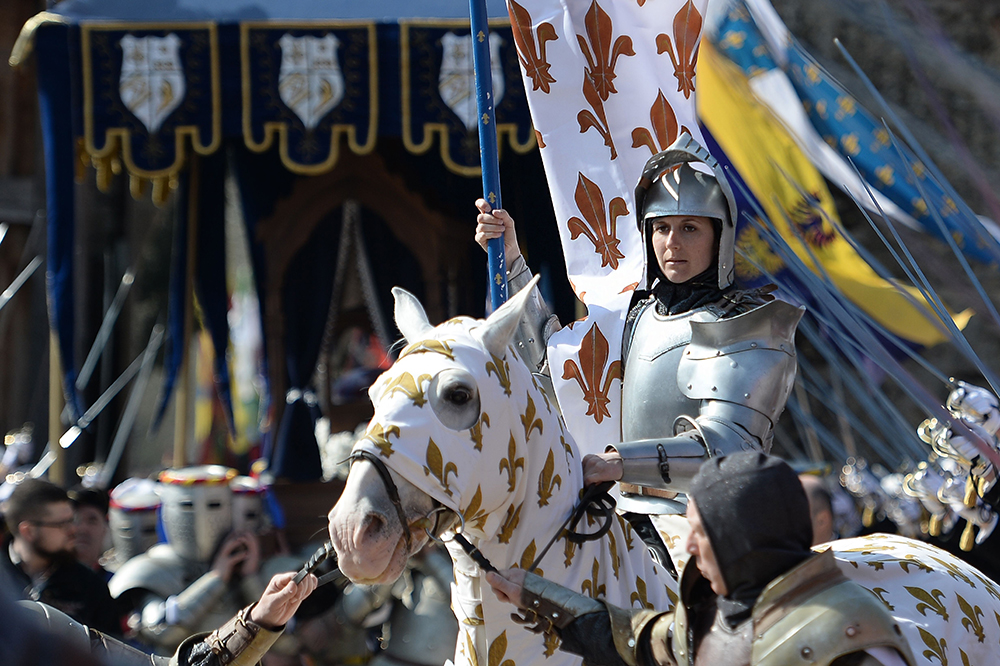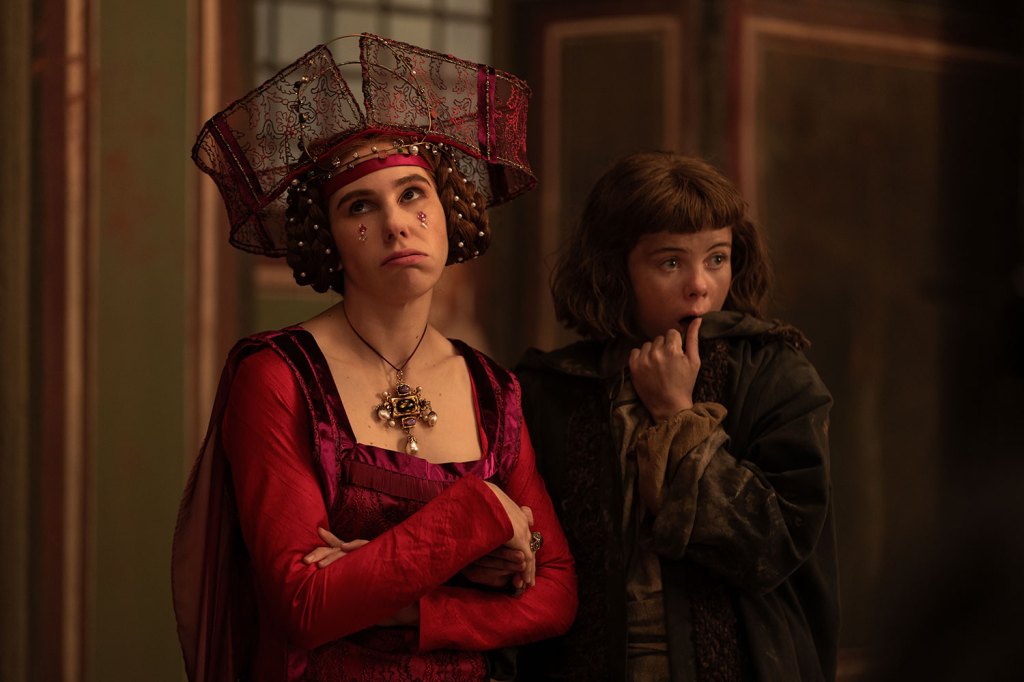
It is the early 9th century. Peace reigns in a small French village as they prepare for a wedding. Garlands are being hung, sheep are being shepherded, all is sunshine and smiles. Then, in a snap, this bucolic bliss bursts as Viking warriors invade the scene and unleash hell.
The original Puy du Fou is unashamedly pro-God, pro-monarchy and Vive la France
A longboat splashes down a chute into the river, another spectacularly emerges from beneath the lake; swords clash, fires erupt, women are carried off and treasures seized. The villagers need a miracle, and it comes with the sudden appearance of a bishop, the blessed St Philibert. Just as the mere invocation of Queen Victoria’s name is enough to make the pirates of Penzance yield, so this sanctus ex machina quells the hairy hordes at the end of a half-hour show. Christianity wins again and so does France.
This is the recurring message of Puy du Fou, a hugely popular historic theme park just south of Cholet in the Vendée that could be coming to Oxfordshire. It is unashamedly pro-God, pro-monarchy and Vive la France. Its biggest spectacle, in a Roman amphitheatre, features chariot-racing, gladiatorial games and the eventual victory of the Christians. A walk-through attraction on the Merovingians ends with the baptism of King Clovis. Another tour through the trenches of Verdun goes heavy on the crosses and carols. A giant rotating stage show focuses on a counter-revolutionary local hero post-Bastille. It is the antithesis of last year’s Olympic opening ceremony in Paris.
This nostalgic patriotism and spiritual devotion may prove to be a bigger stumbling block for those hoping to bring Puy du Fou across the Channel than the usual objections of Nimbys. A Spanish Puy du Fou near Toledo, full of El Cid, Lope de Vega and the veterans of Lepanto, opened in 2021, but could something that celebrates a positive, if varnished, view of British history be allowed? The only sudden appearance of a bishop at a history show here would be to apologise for any offence caused.
Puy du Fou announced its plans to set up in Britain last summer, buying 400 acres near Bicester from a pig farmer, who complained last week that he has been shunned by his neighbours. After losing £10,000 a week for a year, Derek Hedges said farming no longer pays. He added that the theme park’s four historic villages and 13 live shows, six of which will be indoors, would be more like a ‘theatre in the forest’ than a noisy amusement attraction. Those who have visited the French site, as I have twice, would agree.
After a consultation ended in February, the company intends to submit a planning application in the summer. Olivier Strebelle, the chief executive, said it would plant 20,000 trees and create wildflower meadows as well as employ 700 people. The French park, which first opened in the 1970s, has extensive woodland walks and buildings made from traditional materials. Half the estimated 1.5 million visitors to the British park would come by shuttle bus from railway stations and park-and-rides rather than by car.
Ah, but what about what a recent Guardian piece called the ‘dark underbelly’? The original park was created by Philippe de Villiers, a right-wing aristocrat who served as culture secretary under Jacques Chirac and twice ran for the presidency as leader of the nationalist Movement for France. He has described Éric Zemmour, the anti-immigration populist politician, as standing for ‘the defence of civilisation’ and claimed to have kept Covid at bay by drinking pastis. In 2014 the company, now run by his son Nicolas, met Vladimir Putin to discuss building a park in Russia. That project was ditched after the invasion of Crimea, but it has prompted chuntering in the Cotswolds. The 17 Lib Dems, 11 Labour and four Green councillors on Cherwell District Council may not support something they see as Farageland.
Just as problematic for some is the nationalist spin that the park puts on history. In 2022, four French historians wrote a report, entitled ‘Puy du Faux’, that accused it of peddling inaccuracies and clichés about ‘the enemy being synonymous with the foreigner’ and a ‘choice between Christianity and hell’. In response, the historian Thierry Lentz called the authors ‘killjoys’ and contemptuous elitists. France seems to have less of a problem with tweaking history to promote a political agenda (or at least a right-wing one) than we do. An hour or so north of Puy du Fou, the excellent cavalry museum at Saumur has several cases devoted to Napoleon’s triumphs. It is only when you get to the final cabinet outlining his ‘other campaigns’ that you can read a whole paragraph on Waterloo. Though you have to squint.

Puy du Fou is recruiting a panel of British historians to advise on content for the Bicester project, which its artistic team will then present. It could take us from Boudicca to the Blitz, feature jousting and jesters, celebrate the great explorers, our finest writers and musicians, have lots of pomp and circumstance, perhaps even throw in a dash of myth-history in the form of King Arthur and Robin Hood. It could be, dare I say it, fun. If fun is still allowed in the 21st century. ‘The British love their history and love live shows,’ Strebelle said. ‘We don’t know British history but we know how to create emotions in 20 to 30 minutes.’
The mission statement on their website says that they are ‘storytellers’, not historians, and that British creators such as Ridley Scott and Hilary Mantel have been both acclaimed and criticised for remaking historical events and characters. ‘[Our] visitors come to see amazing family entertainment based on history,’ they say. ‘They do not care about hotly contested academic debates.’
Perhaps the market should decide: let Puy du Fou produce a park that cries Vive La Grande-Bretagne and God Save the King (I wonder if it will acknowledge Waterloo and Agincourt?), and its opponents can devise one that celebrates the NHS, Windrush and the Tolpuddle Martyrs. I wonder which would be more popular.






Comments